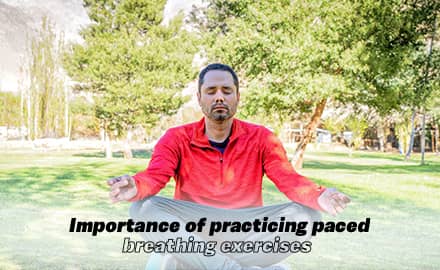Importance of practicing paced breathing exercises
Paced breathing exercises, also known as controlled or rhythmic breathing, involve intentionally regulating the rate and depth of your breaths. These exercises have been practiced for centuries in various cultures and are now widely recognized for their numerous benefits on physical, mental, and emotional well-being. Incorporating paced breathing exercises into your daily routine can bring a sense of calm, reduce stress, improve focus, and promote overall relaxation. Here's why practicing paced breathing exercises is suggested:
- Stress reduction: Paced breathing exercises are highly effective in reducing stress levels. When you engage in slow, controlled breathing, you activate the body's relaxation response, triggering the parasympathetic nervous system. This response counteracts the body's fight-or-flight stress response, helping to calm the mind, decrease anxiety, and promote a sense of tranquility.
- Improved mental clarity and focus: Paced breathing exercises require concentration and attention to the breath. Focusing on the present moment helps quiet the mind and enhances mental clarity. By regulating your breathing, you can enhance your ability to concentrate, improve cognitive function, and increase productivity.
- Enhanced emotional well-being: Paced breathing exercises can have a profound impact on emotional well-being. Deep, slow breaths help activate the body's relaxation response, which promotes the release of endorphins and other feel-good hormones. It can result in improved mood, reduced feelings of depression, and increased overall emotional stability.
- Better sleep quality: Practicing paced breathing exercises before bedtime can help relax the body and mind, making it easier to fall asleep and enjoy a more restful night's sleep. By focusing on slow, deep breaths, you can quiet racing thoughts, release tension, and prepare your body for a state of relaxation conducive to sleep.
- Improved cardiovascular health: Paced breathing exercises have been shown to have positive effects on cardiovascular health. When you engage in slow, deep breathing, it stimulates the vagus nerve, which helps regulate heart rate and blood pressure. This can lead to a reduction in blood pressure, improved heart rate variability, and overall cardiovascular health.
- Enhanced respiratory function: Paced breathing exercises can improve lung capacity and respiratory function. By consciously deepening and slowing down your breaths, you engage the diaphragm and encourage fuller, more efficient breathing. It can help increase oxygen uptake, improve lung function, and enhance respiratory health.
- Stress management tool: Paced breathing exercises are an effective tool for managing stress in various situations. Whether you're facing a challenging task, experiencing a moment of anxiety, or feeling overwhelmed, practicing paced breathing can provide immediate relief. These exercises can be done anytime, anywhere, making them accessible tools for stress management on the go.
Incorporate paced breathing exercises into your routine, and find a quiet and comfortable space. Sit or lie down in a relaxed position. Begin by taking a slow, deep breath through your nose, allowing your abdomen to expand. Hold your breath for a brief moment, and then exhale slowly through your mouth, allowing your abdomen to deflate. Repeat this process for several minutes, gradually lengthening the duration of your inhales and exhales.
You can also explore different techniques such as square breathing (inhaling for a count of four, holding for a count of four, exhaling for a count of four, and pausing for a count of four) or 4-7-8 breathing (inhaling for a count of four, holding for a count of seven, and exhaling for a count of eight). Experiment with different rhythms and find the technique that works best for you.
